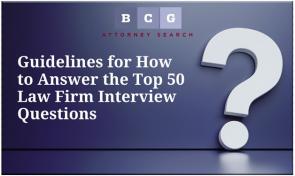Law firms, just like any other organization, must pay close attention to the people they hire. Given the nature of the legal profession, firms must bring on board individuals with the right skills, personality, and experience to succeed in a fast-paced, client-centric environment. This article will provide an in-depth look at the characteristics and qualities law firms should look for when interviewing candidates for positions within their organization.

1. How can I assess a candidate's analytical and problem-solving skills during an interview?
To evaluate a candidate's analytical and problem-solving skills, consider asking open-ended questions that require them to think critically and creatively. You can also present hypothetical scenarios or case studies about their expertise and ask them to discuss potential solutions.
2. What role does professional experience play in identifying the best legal talent?
Professional experience can provide valuable insights into a candidate's ability to handle the legal profession's demands. This includes their capacity to manage complex caseloads, work effectively in high-pressure environments, and collaborate with colleagues and clients. When assessing a candidate's professional experience, consider the quality of their work, the complexity of the cases they have handled, and their track record of success.
3. How important is cultural fit when hiring legal talent?
Cultural fit is an essential factor in the hiring process, as it can significantly impact job satisfaction, employee retention, and overall team dynamics. When evaluating a candidate's cultural fit, consider their work style, values, and interactions with others. A candidate who aligns with your firm's culture and values will likely be engaged, productive, and committed to the organization's long-term success.
4. How can I determine a candidate's legal knowledge and expertise level during the interview process?
To assess a candidate's legal knowledge and expertise, ask questions about their specific practice area, industry, and general legal concepts. You can also request writing samples, such as briefs or memos, to evaluate their ability to effectively research, analyze, and present complex legal issues. Additionally, inquire about their continuing education efforts, industry association involvement, and relevant publications or speaking engagements.
5. How can I assess a candidate's ability to work well under pressure?
To determine a candidate's ability to handle pressure, ask about their experiences working in high-pressure environments, such as tight deadlines, demanding caseloads, or challenging clients. Inquire about their strategies for managing stress and maintaining focus during difficult situations. You can also present hypothetical scenarios that simulate high-pressure situations and observe how they respond.
Strong Communication Skills
Effective communication is paramount in the legal profession. Lawyers must be able to convey complex legal concepts to clients, colleagues, and opposing counsel, both in writing and orally. During an interview, law firms should assess a candidate's ability to:- Clearly articulate their thoughts and ideas
- Listen actively to questions and respond thoughtfully
- Display strong written communication skills (through a resume, cover letter, or writing sample)
Analytical and Critical Thinking Skills
Legal work often involves complex problem-solving and the ability to think critically. Therefore, a candidate with high intelligence and strong analytical skills is essential. These qualities can be identified through various methods, such as evaluating their academic records, observing their performance in problem-solving exercises during interviews, and considering their past professional achievements.Legal professionals must be able to analyze complex situations, identify critical issues, and craft well-reasoned solutions. As such, law firms should evaluate a candidate's ability to:
- Break down complicated problems into manageable parts
- Apply logic and reasoning to reach conclusions
- Exhibit creativity and flexibility in problem-solving
Attention to Detail
Accuracy and precision are essential in legal work, as minor oversights can have significant consequences. Top legal candidates will demonstrate strong attention to detail and excellent organizational skills, ensuring they can manage multiple projects and deadlines without sacrificing quality. To evaluate a candidate's attention to detail, ask for examples of how they've maintained accuracy and organization in their past work. Consider incorporating a written exercise into the interview to assess their writing and proofreading abilities.Meticulous attention to detail is a must for any successful attorney. The slightest error in drafting a legal document or filing a motion can significantly affect a client. Interviewers should look for candidates who:
- Demonstrate precision in their work (e.g., error-free resume and cover letter)
- Have a track record of thoroughness in previous positions
- Can provide examples of how they have managed multiple tasks while maintaining high-quality work
Strong Work Ethic and Time Management Skills
Law firms are known for their demanding work environments, with extended hours and tight deadlines often being the norm. Exceptional legal professional is driven and dedicated to their work. They are willing to put in long hours and go above and beyond to achieve the best results for their clients. During the interview, ask questions about their work habits, how they manage their time, and their approach to handling deadlines and high-pressure situations. Speak with references to confirm that the candidate has demonstrated a strong work ethic and commitment to excellence in their past roles. Candidates should possess a strong work ethic and manage their time effectively. Look for interviewees who:- Show dedication to their work and a willingness to put in the necessary effort
- Can prioritize tasks and manage competing demands
- Exhibit resilience and adaptability in the face of challenges
Collaboration and Teamwork
In many legal settings, attorneys must work together as a team to achieve the best results for their clients. Exceptional legal talent will display strong teamwork and collaboration skills, demonstrating their ability to work effectively with colleagues, support staff, and other professionals. To gauge a candidate's teamwork abilities, ask about their experience working in team environments, and seek input from their references on how well they've collaborated with others.Law practice is often collaborative, with lawyers working together on cases or transactions. An interviewee who can work well within a team is an invaluable asset to a law firm. Assess a candidate's ability to:
- Effectively collaborate with others in various settings
- Show empathy and understanding of others' perspectives
- Demonstrate leadership skills when needed
Integrity and Professionalism
The best legal professionals display high integrity and professionalism in all aspects of their work. They adhere to ethical standards, maintain client confidentiality, and respectfully treat colleagues and opponents. To assess a candidate's integrity and professionalism, inquire about their ethical decision-making process and ask for examples of situations where they've faced ethical dilemmas. Be sure to speak with references to confirm that the candidate has consistently demonstrated these qualities in their previous roles.Lawyers are held to high ethical standards, and law firms must be confident that their employees will act with integrity and professionalism. Interviewers should seek candidates who:
- Exhibit honesty and transparency in their actions and responses
- Demonstrate respect for others and the profession
- Have a history of ethical decision-making
Relevant Legal Knowledge and Experience
The best legal candidates will deeply understand the law and its application. They should be well-versed in legal research, writing, and advocacy. To gauge a candidate's legal knowledge and expertise, consider their academic background and professional experience. Review their publications, case results, and any awards or accolades they may have received. Additionally, ask for references from former colleagues or supervisors to gain insight into their skills and abilities.While legal knowledge can be acquired and developed over time, a candidate with a strong foundation in the relevant area of law is more likely to hit the ground running. Law firms should look for candidates who:
- Possess a solid understanding of the applicable legal principles
- Have practical experience in the relevant area of law (e.g., internships, clinics, or previous employment)
- Show a commitment to staying up-to-date with legal developments
Adaptability and Willingness to Learn
The legal landscape is constantly evolving, and lawyers must be able to adapt to new developments and technologies. Law firms should seek candidates who:- Are open to change and eager to learn new skills
- Can adjust their approach when faced with novel situations
- Demonstrate curiosity and a desire for continuous improvement
Client-Service Orientation
For law firms to thrive, they need attorneys who are skilled in their practice areas and able to contribute to the growth and development of the firm. Top legal talent will possess strong business acumen and an understanding of developing and maintaining client relationships. During the interview, ask candidates about their experience in business development, marketing, and client retention strategies. Also, consider their track record of bringing in new clients and generating revenue for their previous firms. Many of these qualities are highlighted in our video 10 Factors That Matter to BigLaw Firms More Than Your Law School, which shows what BigLaw recruiters prioritize.Lawyers must be able to build and maintain strong relationships with clients. This means understanding and addressing their needs while providing exceptional service. Look for interviewees who:
- Exhibit strong interpersonal skills and emotional intelligence
- Can put themselves in the client's shoes and understand their perspective
- Demonstrate a history of successful client interactions in previous roles
Cultural Fit and Alignment with Firm Values
Finally, law firms must consider how well a candidate will fit into their organizational culture and align with the firm's values. A strong cultural fit can contribute to a positive work environment, increased employee engagement, and overall success. Assess candidates for:- Compatibility with the firm's culture and work style
- Alignment with the firm's values and mission
- Potential to contribute to the firm's long-term goals
Red Flags to Watch for When Interviewing Legal Candidates
Red flags to look out for during the interview process may include the following:- Inability to provide specific examples of past work or accomplishments.
- Vague or inconsistent responses to questions about their experience, skills, or knowledge.
- A history of job-hopping or frequent changes in employment.
- Negative or unprofessional comments about previous employers or colleagues.
- Lack of enthusiasm or engagement during the interview.
- Disregard ethical or professional conduct standards.
Conclusion
Hiring the right talent is essential for the success of any law firm. By focusing on the qualities and characteristics outlined above, law firms can identify candidates well-equipped to excel in the legal profession and contribute meaningfully to the organization. Remember that the hiring process is not one-size-fits-all, and firms should tailor their approach to their specific needs and priorities. However, by emphasizing strong communication skills, analytical thinking, attention to detail, work ethic, collaboration, integrity, legal knowledge, adaptability, client-service orientation, and cultural fit, law firms can build a talented, diverse, and successful team.- To simplify the complexity of hiring frameworks, Warren Buffett’s advice boils it down to just three timeless essentials, detailed in The Top Three Qualities Warren Buffett Looks for When Hiring Attorneys and Managers.
About Harrison Barnes
No legal recruiter in the United States has placed more attorneys at top law firms across every practice area than Harrison Barnes. His unmatched expertise, industry connections, and proven placement strategies have made him the most influential legal career advisor for attorneys seeking success in Big Law, elite boutiques, mid-sized firms, small firms, firms in the largest and smallest markets, and in over 350 separate practice areas.
A Reach Unlike Any Other Legal Recruiter
Most legal recruiters focus only on placing attorneys in large markets or specific practice areas, but Harrison places attorneys at all levels, in all practice areas, and in all locations-from the most prestigious firms in New York, Los Angeles, and Washington, D.C., to small and mid-sized firms in rural markets. Every week, he successfully places attorneys not only in high-demand practice areas like corporate and litigation but also in niche and less commonly recruited areas such as:
- Immigration Law
- Workers Compensation
- Insurance
- Family Law
- Trust and Estate
- Municipal law
- And many more...
This breadth of placements is unheard of in the legal recruiting industry and is a testament to his extraordinary ability to connect attorneys with the right firms, regardless of market size or practice area.
Proven Success at All Levels
With over 25 years of experience, Harrison has successfully placed attorneys at over 1,000 law firms, including:
- Top Am Law 100 firms such including Sullivan and Cromwell, and almost every AmLaw 100 and AmLaw 200 law firm.
- Elite boutique firms with specialized practices
- Mid-sized firms looking to expand their practice areas
- Growing firms in small and rural markets
He has also placed hundreds of law firm partners and has worked on firm and practice area mergers, helping law firms strategically grow their teams.
Unmatched Commitment to Attorney Success - The Story of BCG Attorney Search
Harrison Barnes is not just the most effective legal recruiter in the country, he is also the founder of BCG Attorney Search, a recruiting powerhouse that has helped thousands of attorneys transform their careers. His vision for BCG goes beyond just job placement; it is built on a mission to provide attorneys with opportunities they would never have access to otherwise. Unlike traditional recruiting firms, BCG Attorney Search operates as a career partner, not just a placement service. The firm's unparalleled resources, including a team of over 150 employees, enable it to offer customized job searches, direct outreach to firms, and market intelligence that no other legal recruiting service provides. Attorneys working with Harrison and BCG gain access to hidden opportunities, real-time insights on firm hiring trends, and guidance from a team that truly understands the legal market. You can read more about how BCG Attorney Search revolutionizes legal recruiting here: The Story of BCG Attorney Search and What We Do for You.
The Most Trusted Career Advisor for Attorneys
Harrison's legal career insights are the most widely followed in the profession.
- His articles on BCG Search alone are read by over 150,000 attorneys per month, making his guidance the most sought-after in the legal field. Read his latest insights here.
- He has conducted hundreds of hours of career development webinars, available here: Harrison Barnes Webinar Replays.
- His placement success is unmatched-see examples here: Harrison Barnes' Attorney Placements.
- He has created numerous comprehensive career development courses, including BigLaw Breakthrough, designed to help attorneys land positions at elite law firms.
Submit Your Resume to Work with Harrison Barnes
If you are serious about advancing your legal career and want access to the most sought-after law firm opportunities, Harrison Barnes is the most powerful recruiter to have on your side.
Submit your resume today to start working with him: Submit Resume Here
With an unmatched track record of success, a vast team of over 150 dedicated employees, and a reach into every market and practice area, Harrison Barnes is the recruiter who makes career transformations happen and has the talent and resources behind him to make this happen.
A Relentless Commitment to Attorney Success
Unlike most recruiters who work with only a narrow subset of attorneys, Harrison Barnes works with lawyers at all stages of their careers, from junior associates to senior partners, in every practice area imaginable. His placements are not limited to only those with "elite" credentials-he has helped thousands of attorneys, including those who thought it was impossible to move firms, find their next great opportunity.
Harrison's work is backed by a team of over 150 professionals who work around the clock to uncover hidden job opportunities at law firms across the country. His team:
- Finds and creates job openings that aren't publicly listed, giving attorneys access to exclusive opportunities.
- Works closely with candidates to ensure their resumes and applications stand out.
- Provides ongoing guidance and career coaching to help attorneys navigate interviews, negotiations, and transitions successfully.
This level of dedicated support is unmatched in the legal recruiting industry.
A Legal Recruiter Who Changes Lives
Harrison believes that every attorney-no matter their background, law school, or previous experience-has the potential to find success in the right law firm environment. Many attorneys come to him feeling stuck in their careers, underpaid, or unsure of their next steps. Through his unique ability to identify the right opportunities, he helps attorneys transform their careers in ways they never thought possible.
He has worked with:
- Attorneys making below-market salaries who went on to double or triple their earnings at new firms.
- Senior attorneys who believed they were "too experienced" to make a move and found better roles with firms eager for their expertise.
- Attorneys in small or remote markets who assumed they had no options-only to be placed at strong firms they never knew existed.
- Partners looking for a better platform or more autonomy who successfully transitioned to firms where they could grow their practice.
For attorneys who think their options are limited, Harrison Barnes has proven time and time again that opportunities exist-often in places they never expected.
Submit Your Resume Today - Start Your Career Transformation
If you want to explore new career opportunities, Harrison Barnes and BCG Attorney Search are your best resources. Whether you are looking for a BigLaw position, a boutique firm, or a move to a better work environment, Harrison's expertise will help you take control of your future.
Submit Your Resume Here to get started with Harrison Barnes today.
Harrison's reach, experience, and proven results make him the best legal recruiter in the industry. Don't settle for an average recruiter-work with the one who has changed the careers of thousands of attorneys and can do the same for you.
About BCG Attorney Search
BCG Attorney Search matches attorneys and law firms with unparalleled expertise and drive, while achieving results. Known globally for its success in locating and placing attorneys in law firms of all sizes, BCG Attorney Search has placed thousands of attorneys in law firms in thousands of different law firms around the country. Unlike other legal placement firms, BCG Attorney Search brings massive resources of over 150 employees to its placement efforts locating positions and opportunities its competitors simply cannot. Every legal recruiter at BCG Attorney Search is a former successful attorney who attended a top law school, worked in top law firms and brought massive drive and commitment to their work. BCG Attorney Search legal recruiters take your legal career seriously and understand attorneys. For more information, please visit www.BCGSearch.com.
Harrison Barnes does a weekly free webinar with live Q&A for attorneys and law students each Wednesday at 10:00 am PST. You can attend anonymously and ask questions about your career, this article, or any other legal career-related topics. You can sign up for the weekly webinar here: Register on Zoom
Harrison also does a weekly free webinar with live Q&A for law firms, companies, and others who hire attorneys each Wednesday at 10:00 am PST. You can sign up for the weekly webinar here: Register on Zoom
You can browse a list of past webinars here: Webinar Replays
You can also listen to Harrison Barnes Podcasts here: Attorney Career Advice Podcasts
You can also read Harrison Barnes' articles and books here: Harrison's Perspectives
Harrison Barnes is the legal profession's mentor and may be the only person in your legal career who will tell you why you are not reaching your full potential and what you really need to do to grow as an attorney--regardless of how much it hurts. If you prefer truth to stagnation, growth to comfort, and actionable ideas instead of fluffy concepts, you and Harrison will get along just fine. If, however, you want to stay where you are, talk about your past successes, and feel comfortable, Harrison is not for you.
Truly great mentors are like parents, doctors, therapists, spiritual figures, and others because in order to help you they need to expose you to pain and expose your weaknesses. But suppose you act on the advice and pain created by a mentor. In that case, you will become better: a better attorney, better employees, a better boss, know where you are going, and appreciate where you have been--you will hopefully also become a happier and better person. As you learn from Harrison, he hopes he will become your mentor.
To read more career and life advice articles visit Harrison's personal blog.






